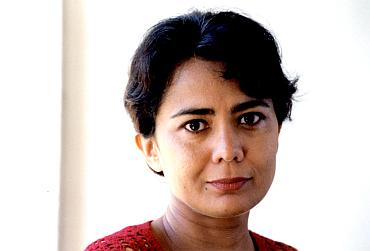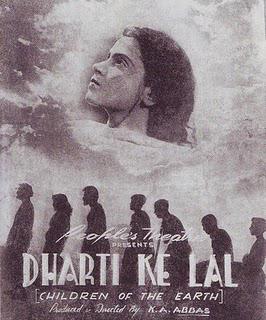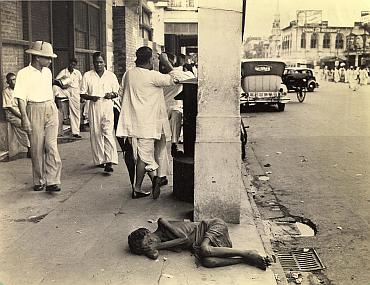Arthur J Pais on author Madhusree Mukerjee's rebuttal of historian Arthur Herman's critique.
For Churchill admirers like historian Arthur Herman (Churchill and Gandhi), who have denounced her book Churchill's Secret War, Madhusree Mukerjee has a quick response. 'Herman is the established historian --not I,' she says in her essay, Dressing the Emperor. 'Sometimes it takes a rank outsider to point out that the emperor wears no clothes.'
Herman reviewed Mukerjee's book on the Churchill Centre Web site under the title: Without Churchill, India's Famine Would Have Been Worse.
 'No Churchill critic, not even Ms Mukerjee, has yet found a way to blame Churchill for actually triggering the famine in the way that, for example, Stalin caused the Great Famine in the Ukraine or Mao the mass starvations during China's "Great Leap Forward",' he wrote.
'No Churchill critic, not even Ms Mukerjee, has yet found a way to blame Churchill for actually triggering the famine in the way that, for example, Stalin caused the Great Famine in the Ukraine or Mao the mass starvations during China's "Great Leap Forward",' he wrote.
Mukerjee responded that while Churchill's culpability in triggering famine was not on the same scale as that of Stalin or Mao, it was not absent. 'In January 1943, Churchill withdrew 60 per cent of the shipping from the Indian Ocean area, precluding any possibility of meeting the Indian government's demand for 600,000 tons of wheat by April,' she wrote in the essay on her Web site.
'As a result, British officials in India realized they could not feed the army and factory workers: they could not keep the war effort going. They panicked and began purchasing rice on the open market, paying any price that the brokers demanded, and triggering a steep price rise that precipitated famine by February or March. Meanwhile, rice exports continued.'
'Unfortunately for the author, the actual record contradicts her account at almost every point When the War Cabinet became fully aware of the extent of the famine, on 24 September 1943, it agreed to send 200,000 tons of grain to India by the end of the year,' Herman said. 'Far from seeking to starve India, Churchill and his cabinet sought every way to alleviate the suffering without undermining the war effort. The war--not starving Indians or beating them into submission--remained the principal concern.'
'Churchill's comparison with Hitler is the theme of the book'
Image: A poster of Dharti ke lal, a movie that chronicled the Bengal famineIn response, the War Cabinet ultimately sent 80,000 tons of wheat and 130,000 tons of barley. Such quantities, Linlithgow lamented, "will go nowhere in meeting our essential demands".'
Where is the evidence to back up the claim that 'Churchill and his cabinet sought every way to alleviate the suffering without undermining the war effort,' she asks. 'The stockpile was for use after the war--such vast quantities could only have been delivered after Germany was defeated. It was of little use to the war effort.'
Herman describes events of the war on several fronts, and asks, 'How likely was it that Churchill would respond to the news of the Bengal famine---the seriousness of which was yet unrealized by his India advisers Viceroy Linlithgow and secretary for India Leo Amery (then secretary of state for India)--as anything more than an unwelcome distraction?'

'That news of a famine was "an unwelcome distraction" to a man who shed tears when Britons lined up to buy birdseed is testimony to the profound racism that motivated, at least in part, this decision,' Mukerjee responded.
Herman acknowledged this racism, and excused it: 'Churchill held views on Indians and other non-whites that are very far from our thinking today,' he wrote. 'Yet the truth runs more deeply against Mukerjee than she is willing to admit. Her evidence of Churchill's intransigence on India stems mainly from Leo Amery's diary, where he recorded every one of the Prime Minister's furious outbursts whenever Amery brought up the famine in the War Cabinet, whether Churchill meant what he said or not.'
He added that Amery was so frustrated by Churchill's rants on India that he compared Churchill to Hitler. 'This invidious comparison of Churchill with Hitler is the thematic hinge of the book,' he complained.
'Gandhi ignored the famine'
Image: Deprivation during the Bengal famineGandhi was incarcerated from August 1942 to May 1944 --the period of famine and more, Mukerjee responded. What could he have done? 'And although by the 20th century the British Raj had indeed acquired much experience with famine, that it "had always handled famines with efficiency" is a stretch. Read Late Victorian Holocausts by Mike Davis.'

In response to Harman's charge that she is not historian, Mukerjee wrote, 'Indeed I am not a historian, but a journalist and scientist. My approach to history was inspired by my training as a scientist. In both cases, one discerns the facts as well as one can, and then seeks the theory that best fits the facts. If preconceptions clash with the data, it is the former that must be discarded, not the latter. As to which of us--Herman or I--have done a greater disservice to historical and moral truth, I doubt this essay will help anyone to decide that. Those who care to read my book will at least have the evidence at hand.'




article